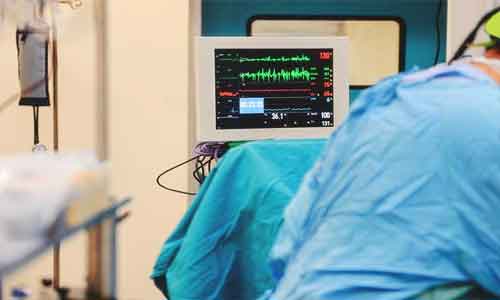- Home
- Editorial
- News
- Practice Guidelines
- Anesthesiology Guidelines
- Cancer Guidelines
- Cardiac Sciences Guidelines
- Critical Care Guidelines
- Dentistry Guidelines
- Dermatology Guidelines
- Diabetes and Endo Guidelines
- Diagnostics Guidelines
- ENT Guidelines
- Featured Practice Guidelines
- Gastroenterology Guidelines
- Geriatrics Guidelines
- Medicine Guidelines
- Nephrology Guidelines
- Neurosciences Guidelines
- Obs and Gynae Guidelines
- Ophthalmology Guidelines
- Orthopaedics Guidelines
- Paediatrics Guidelines
- Psychiatry Guidelines
- Pulmonology Guidelines
- Radiology Guidelines
- Surgery Guidelines
- Urology Guidelines
Opioid use dangerous in patients hospitalized with heart failure and sleep apnea

USA: Patients hospitalized with acute heart failure (HF) are at a higher risk of sleep-disordered breathing (SDB) or sleep apnea. Now, a recent study in the journal Annals of the American Thoracic Society has found that opioid use in such patients to be highly prevalent and associated with a greater likelihood of escalation of care -- defined as transfer to the intensive care unit [ICU], 30-day readmission, and length of stay.
According to the study, approximately 26% of high-risk patients with HF and SDB who received opioids required urgent transfer to an ICU due to breathing problems and other issues, versus only 4% of patients not given the medications.
SDB is highly prevalent in adults hospitalized with acute heart failure. Data are limited on the implications of inadvertent opiate use in this population. Sunil Sharma, the director of the West Virginia University Medical ICU, in Morgantown, and colleagues determined the prevalence and impact of in-hospital opiate use in adults hospitalized for acute heart failure.
For the purpose, the researchers selected a sequential group of adult participants (n=301) who were admitted to the hospital for acute heart failure and received a portable sleep study (PSS) after screening for SDB using the STOP-BANG questionnaire. The use of opiates' need for escalation of care was assessed using a retrospective review of charts. A logistic regression model was used to calculate propensity scores for each participant with a screening apnea-hypopnea index (AHI) greater than or equal to 10/h. Study endpoints, including escalation of care to the ICU and 30-day hospital readmission.
Read Also: Sleep Apnea patients not using CPAP at higher risk of heart failure
Key findings of the study include:
- Overall, 125 of 301 (41.5%) received opiates in the hospital, and 149 (49.5%) patients had an AHI greater than or equal to 10/h by PSS (high risk of SDB). In this high-risk group, 47 of 149 (32%) received opiates.
- Among those with an AHI greater than or equal to 10/h, escalation of care occurred in 12 of 47 (26%) of those who received opiates versus 4 of 102 (4%) of those who did not.
- Similarly, readmission within 30 days occurred in 7 of 47 (15%) of those who received opiates versus 9 of 102 (9%) of those who did not.
- Mean length of stay (days) did not differ between groups (weighted estimate of treatment difference, −0.3 d).
Read Also: Sleep Apnea may lead to sudden heart attack and death
The study, "Opiate Use and Escalation of Care in Hospitalized Adults with Acute Heart Failure and Sleep-disordered Breathing (OpiatesHF Study)," is published in the Annals of the American Thoracic Society.

Disclaimer: This site is primarily intended for healthcare professionals. Any content/information on this website does not replace the advice of medical and/or health professionals and should not be construed as medical/diagnostic advice/endorsement or prescription. Use of this site is subject to our terms of use, privacy policy, advertisement policy. © 2020 Minerva Medical Treatment Pvt Ltd